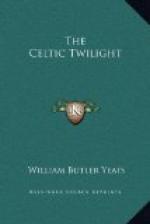No wonder he was afraid, for the fort has long been circled by ill-boding rumours. It is on the ridge of a small hill, on whose northern slope lie a few stray cottages. One night a farmer’s young son came from one of them and saw the fort all flaming, and ran towards it, but the “glamour” fell on him, and he sprang on to a fence, cross-legged, and commenced beating it with a stick, for he imagined the fence was a horse, and that all night long he went on the most wonderful ride through the country. In the morning he was still beating his fence, and they carried him home, where he remained a simpleton for three years before he came to himself again. A little later a farmer tried to level the fort. His cows and horses died, and an manner of trouble overtook him, and finally he himself was led home, and left useless with “his head on his knees by the fire to the day of his death.”
A few hundred yards southwards of the northern angle of Rosses is another angle having also its cave, though this one is not covered with sand. About twenty years ago a brig was wrecked near by, and three or four fishermen were put to watch the deserted hulk through the darkness. At midnight they saw sitting on a stone at the cave’s mouth two red-capped fiddlers fiddling with all their might. The men fled. A great crowd of villagers rushed down to the cave to see the fiddlers, but the creatures had gone.
To the wise peasant the green hills and woods round him are full of never-fading mystery. When the aged countrywoman stands at her door in the evening, and, in her own words, “looks at the mountains and thinks of the goodness of God,” God is all the nearer, because the pagan powers are not far: because northward in Ben Bulben, famous for hawks, the white square door swings open at sundown, and those wild unchristian riders rush forth upon the fields, while southward the White Lady, who is doubtless Maive herself, wanders under the broad cloud nightcap of Knocknarea. How may she doubt these things, even though the priest shakes his head at her? Did not a herd-boy, no long while since, see the White Lady? She passed so close that the skirt of her dress touched him. “He fell down, and was dead three days.” But this is merely the small gossip of faerydom—the little stitches that join this world and the other.




